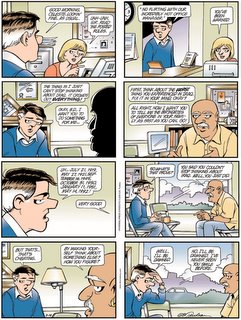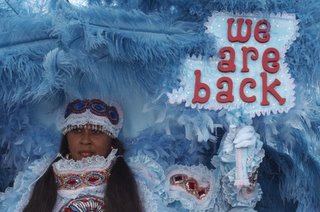Tuesday, February 28, 2006
Monday, February 27, 2006
Octavia Butler
 Octavia Butler died Friday. A great loss. One of a small group of African Americans writing science fiction, Butler also avoided the typical androids/laser guns/boy
Octavia Butler died Friday. A great loss. One of a small group of African Americans writing science fiction, Butler also avoided the typical androids/laser guns/boy hero brand of science fiction and used the genre to examine race, gender, oppression and intolerance, and envionmentalism.
hero brand of science fiction and used the genre to examine race, gender, oppression and intolerance, and envionmentalism.
I haven't read enough of her work. I regret that I now catch up after her death.

Science Fiction Writer Octavia Butler Dies
Octavia Butler, brilliant master of sci-fi, dies at 58
tag: Octavia Butler
Sunday, February 26, 2006
Blog Against Sexism Day!
Blog Against Sexism Day
March 8, 2006
vegankid.solidaritydesign.net/2006/02/12/blog-against-sexism-day/
this time, i'll get it right
Saturday, February 25, 2006
White to Black to Something In Between, Yahoo! Style

On Monday, Feb. 20, the Yahoo! Doonesbury shows a meant-to-be-black man with dark brown skin calling B.D. “bro”:

But on Uclick, though the counselor is clearly not dark brown, his skin tone is darker than on Sunday; he may not be black but he surely is not a white man. The “bro” seems meant to “signify” race regardless of his actual shade of brown:

By Tuesday, the counselor on both Yahoo! and Uclick is an off-white and stays that way for the rest of the week.
Yahoo:

Uclick.com:

What happened? Web color problems? Did someone at Yahoo! see “bro” and think the character wasn’t dark enough? Was it to make the skin match “bro”? Then why pull it back? And why was the character white on Sunday when first introduced then darkened with off-peach tones and an awkward “bro”? What did Trudeau intend? Where did the decisions occur?
The letter is in the works…….
Works Cited
Trudeau, Gary. “Doonesbury.” Cartoon. Uclick.com. 19 Feb. 2006. 26 Feb. 2006
Trudeau, Gary. “Doonebury.” Cartoon. Uclick.com. 20 Feb. 2006. 26 Feb. 2006
Trudeau, Gary. “Doonebury.” Cartoon. Uclick.com. 20 Feb. 2006. 26 Feb. 2006
Trudeau, Gary. “Doonebury.” Cartoon. Uclick.com. 21 Feb. 2006. 26 Feb. 2006
Trudeau, Gary. “Doonebury.” Cartoon. Uclick.com. 21 Feb. 2006. 26 Feb. 2006
Tuesday, February 21, 2006
Hi, Yellow Bitch
 In class we touched on the nappy hair issue and I added that I’d heard as a child, How can such a yellow girl have such nappy hair? (Also, when older, I heard, stuck-up Creole bitch, stuck up yellow bitch, and stuck up high yellow bitch.) It was on my mind because of the newspaper article Sunday, far too short, on Haki Madhubuti, a man and writer I admire even though, maybe because, I don't agree with him on all points. But one part of the interview struck memory and set me thinking:
In class we touched on the nappy hair issue and I added that I’d heard as a child, How can such a yellow girl have such nappy hair? (Also, when older, I heard, stuck-up Creole bitch, stuck up yellow bitch, and stuck up high yellow bitch.) It was on my mind because of the newspaper article Sunday, far too short, on Haki Madhubuti, a man and writer I admire even though, maybe because, I don't agree with him on all points. But one part of the interview struck memory and set me thinking: Q: Was being light-skinned a problem?
A: Being high yellow was always a problem, yes. What happened, early in the struggle in the 1960s, I would always be challenged by men in the struggle that were in some cases darker than I was but not as intellectually referenced. There was always the question, was I black enough, could I be trusted in the deepest of struggle? I decided I was going to have to outwork everybody in the black community, not tangential to it, not parallel to it, not in some academic university setting. I would really have to produce in the black community. That was my mission.
I was pleased to see "high yellow" and that end of the colorism spectrum mentioned in the newspaper but it was equally painful. When suspect, you must work harder than, be more committed than, be more hardcore and "authentic" than anyone else. Which is not authentic, in my opinion. Peers, adults, strangers, family suspected I wasn't "down" because I was light and almost white-looking (except for the nappy hair and nose--and not for long; I still get in the sun as much as possible), a decision made before I spoke or got close enough to distinguish one eye from the other. The assumption was I thought lighter meant "better." I grew up during the shift from near-universal Black pride in education and hard work to the school/kid culture of today in which As or Bs, knowing how to spell, liking to read (anything, not just Jane Austen) meant you were "acting/tryin' to be white" and in my book-smart-straight-As-glasses- fat-unathletic-too-bookish-to-be (or care much about being)-hip case, I was an inherent traitor. But instead of taking the usual path, one I saw almost every other light-skinned person around me take (and had taken and I would see take over and over), the path Madhubuti speaks of, I decided to get comfortable with, if not downright like, being an outsider. I didn't turn away from blackness or pass or become infatuated with false "superiority" based on internalized white supremacy (I’m not a nationalist nor am I an integrationist) but turned away from the daily pit fight of proving my blackness, proving where I stood every second and inch, proving every minute Who I Really Was.
 And it is still a problem. For me and others. I wait for the you're-not-black-enough shoe to hit the back of my head. Every day I fear all my not-black-enoughs will jeopardize me at the University. Yet I still contrarily resist playing the Prove-It Game, still to my detriment but I stubbornly cling. The same essentialism that says I must like X and behave like Y to "be/prove/signify" I am black is the same that says my skin color determines my intelligence, moral values and reproductive choices and that says my uterus is the center of and only justification for my existence. I eat my beans with a gravy, drink pot liquor from greens, eat black-eyed peas on New Years and red beans on Mardi Gras and tell my daughter proudly about black history and braid her curly, wavy, somewhat kinky, thick, beautiful hair. My skin gets ashy. My hair stays dry. I experience racism. And colorism. I get up early to go to Zulu and ignore Rex. Yet I do not know much about Mardi Gras Indians, Martinique, slave markets, Haiti, Senegal, underground rap, the Ninth Ward or the old Magnolia projects or what “flossin’ “ means. I sort of know what crunk is now after many months. What disturbs me is that the black-enough bar slides up, down and sideways depending on who is holding it over your head and for what reason, to put you in your place or to just plain fucking bash your head in.
And it is still a problem. For me and others. I wait for the you're-not-black-enough shoe to hit the back of my head. Every day I fear all my not-black-enoughs will jeopardize me at the University. Yet I still contrarily resist playing the Prove-It Game, still to my detriment but I stubbornly cling. The same essentialism that says I must like X and behave like Y to "be/prove/signify" I am black is the same that says my skin color determines my intelligence, moral values and reproductive choices and that says my uterus is the center of and only justification for my existence. I eat my beans with a gravy, drink pot liquor from greens, eat black-eyed peas on New Years and red beans on Mardi Gras and tell my daughter proudly about black history and braid her curly, wavy, somewhat kinky, thick, beautiful hair. My skin gets ashy. My hair stays dry. I experience racism. And colorism. I get up early to go to Zulu and ignore Rex. Yet I do not know much about Mardi Gras Indians, Martinique, slave markets, Haiti, Senegal, underground rap, the Ninth Ward or the old Magnolia projects or what “flossin’ “ means. I sort of know what crunk is now after many months. What disturbs me is that the black-enough bar slides up, down and sideways depending on who is holding it over your head and for what reason, to put you in your place or to just plain fucking bash your head in.I know damn well what we think of as race is a social rather than a biological construct and fact (see the American Association of Physical Anthropologists Statement on Biological Aspects of Race). I also know that I have never in my life felt like a white person or wanted to be one. I did not marry who I did because he was white. And I push my students because I know excellence is not dependent on skin color, that they are capable and will not succumb to stereotype, self or group underestimation or condescension. I do not agree all black people are loud or soft-spoken or any single or monochromatic (pun intended) feature. At the University, the skin colors are all in a certain range but the backgrounds and philosophies range more than at, say, an Ivy League school where nearly everyone, white, black, Latino, Asian, is upper-middle class or better and suburban and has pretty much the same law school/business/med school ambitions.
I did not go out “looking for a white man.” I do not think I am of a different class, order, level or magnitude “than other black people.” I do not hate blackness or my "Black self." I do not choose my friends based on skin color and the few times I have, always favoring the black person over the white, I have gotten deeply, unforgettably burned. I do not choose all the things I eat, read, listen to, crave, dream about, hope for and buy based on “blackness” or
 “whiteness” but on quality, price and my personal desire and/or plan. I also do not do this without inner conflict, angst, frustration, existential anger and hurt feelings, mine and those of others. Especially mine.
“whiteness” but on quality, price and my personal desire and/or plan. I also do not do this without inner conflict, angst, frustration, existential anger and hurt feelings, mine and those of others. Especially mine.How will it end, ain't got a friend
My only sin is in my skin
What did I do to be so black and blue
Black and Blue, performed by Louis Armstrong
tag: Haki Madhubuti, colorism, high yellow, race, Creole, biology of race, New Orleans
Friday, February 17, 2006
Fetish #2
 It's not very "black" of me but...Henry Rollins is my favorite angry white man. I drove a lot of miles to The End of Silence (I think it was) but even if i hadn't, this letter in response to being "warned" that he had been ratted out to the Australian National Security Hotline would make him my kind of guy:
It's not very "black" of me but...Henry Rollins is my favorite angry white man. I drove a lot of miles to The End of Silence (I think it was) but even if i hadn't, this letter in response to being "warned" that he had been ratted out to the Australian National Security Hotline would make him my kind of guy:I was reading a book called Jihad by Ahmed Rashid which is a history of Central Asia. I didn't speak to the man next to me pastSwoon.how do you do. I think Ahmed Rashid is published by Yale University Press. Bush's alma mater. Please tell your government and everyone in your office to go fuck themselves. Tell them twice. If your boss is looking for something to do, you can tell him I suggest he go fuck himself. Baghdad's safer than my hometown and your PM is a sissy. You have a nice night. (emphasis mine)
Show me your PTSD!
 Mister G (husband of G Bitch) works at Another University, a “better” one with Ivy League tuition and instructors, also religious but not as tightly wound and predominantly white, and professors there are suffering the post-Kat pinch, in their eyes anyway—tenured professors (only; all part-time and adjunct dismissed) teaching, instead of the regular 3 a semester that they regularly complained bitterly about, four classes each semester. (gasp, whine, moan, sound of dragging feet) Mister says the profs are starting to crack. Entire departments are job hunting. One professor is so demoralized by writing multiple recommendations for colleagues applying for jobs that he has reluctantly decided to also job hunt. Those not job hunting are preparing to retire. All this over a 4/4 schedule, the exact kind I have. No Bitch PhD-ish seminars and teaching assistant here and even when I have fewer than 75 students, it is still 12 months of work in 9 months, stuffing 55 hours of work into a 35-hour week, 4 preps 2-3 times a week, 1-3 hours of email a day, a minimum of 360 essays a semester and twice that poundage of homework. I use the same books, essays, stories and poems so I don’t have to read anything, just look at my notes scribbled in the book and start typing. And this is a tenure-track position. (Not this year but normally it is.) I have fewer students this semester than I’ve ever had, spend less time on “campus” than in the past but I can’t keep up. Other professors look dazed, worn down, rubbed too hard, exhausted, pinched and prickly. I joke (not really) to students, "I'm sorry but my PTSD is really showing today." And even when I have a stretch of uninterrupted (or at least minimally interrupted) time to work, it is hell to concentrate. And everyone, faculty and students, feels the same way. My A students, while they perform brilliantly in class and literally teach the students around them, flake out, get and stay sick, don’t follow assignments, forget deadlines, come 15 minutes late every fucking day. (And outperform the ones who came early.)
Mister G (husband of G Bitch) works at Another University, a “better” one with Ivy League tuition and instructors, also religious but not as tightly wound and predominantly white, and professors there are suffering the post-Kat pinch, in their eyes anyway—tenured professors (only; all part-time and adjunct dismissed) teaching, instead of the regular 3 a semester that they regularly complained bitterly about, four classes each semester. (gasp, whine, moan, sound of dragging feet) Mister says the profs are starting to crack. Entire departments are job hunting. One professor is so demoralized by writing multiple recommendations for colleagues applying for jobs that he has reluctantly decided to also job hunt. Those not job hunting are preparing to retire. All this over a 4/4 schedule, the exact kind I have. No Bitch PhD-ish seminars and teaching assistant here and even when I have fewer than 75 students, it is still 12 months of work in 9 months, stuffing 55 hours of work into a 35-hour week, 4 preps 2-3 times a week, 1-3 hours of email a day, a minimum of 360 essays a semester and twice that poundage of homework. I use the same books, essays, stories and poems so I don’t have to read anything, just look at my notes scribbled in the book and start typing. And this is a tenure-track position. (Not this year but normally it is.) I have fewer students this semester than I’ve ever had, spend less time on “campus” than in the past but I can’t keep up. Other professors look dazed, worn down, rubbed too hard, exhausted, pinched and prickly. I joke (not really) to students, "I'm sorry but my PTSD is really showing today." And even when I have a stretch of uninterrupted (or at least minimally interrupted) time to work, it is hell to concentrate. And everyone, faculty and students, feels the same way. My A students, while they perform brilliantly in class and literally teach the students around them, flake out, get and stay sick, don’t follow assignments, forget deadlines, come 15 minutes late every fucking day. (And outperform the ones who came early.)A former student, one I felt I graciously, generously gave a C to, emailed for a recommendation. Not one single assignment improved over the course of the semester and she came to my office the least number of times for the least amount of help. From commas to subject-verb agreement to line breaks to quotation marks and indentation for dialogue, not one thing got better. I ignored her email for a couple days b/c I didn’t want to tell her I couldn’t possibly recommend her for anything academic. But it’s for a sorority. Yeah, I’ll recommend her. She may be a sorority girl but not a real English major. I wonder if she still is an English major. She was friendly, talkative but not very serious, it seemed, and much of her discussion about literature, in class especially, was directly related to how it made her “feel” and how much it related to her own life, especially her parents and her father and past boyfriends. Some of my best teaching moments were shifting the class from her trite discussions back to the deeper aspects of literature while also making her feel heard. I’ve made her sweat. She also wants it Monday. I could piddle one out Monday after lunch, maybe. Miss C Student was in my blah blah blah…
Carnival has started, Mardi Gras is in less than 2 weeks. (Mardi Gras is one day, like Lundi Gras; Carnival is the preceding season of king cakes, parades and balls.) I love Mardi Gras only slightly less than Jazz Fest. My priority today was not grading the
 23 essays I received Friday. (to clear my plate for the 20 I receive Monday) or the 4 lesson plans I need by Monday morning or getting my office computer to my office space or the pre-midterm alerts to students at risk of failing—it was getting to the grocery store, before parades trap me in my home, to lay in supplies for a weekend of parades and grilling and drinking. I’m a New Orleanian with New Orleanian priorities.
23 essays I received Friday. (to clear my plate for the 20 I receive Monday) or the 4 lesson plans I need by Monday morning or getting my office computer to my office space or the pre-midterm alerts to students at risk of failing—it was getting to the grocery store, before parades trap me in my home, to lay in supplies for a weekend of parades and grilling and drinking. I’m a New Orleanian with New Orleanian priorities.Thursday, February 02, 2006
The novoir (and...)
 ...i'm just beat. The "campus" is surreal. The acoustics are horrible. Rearranging tables, chairs and tablecloths has become guess-what-the-room-looks-like-today? I like my chaos internal, manageable, under scrutiny and analysis and tapped for whatever can be siphoned off, not more chaos in the midst of increasingly thick and nonsensical traffic, the building angst as denial lifts and the hotel isn't so much fun (and neither is commuting for those who still are), and too much shit hasn't changed, hasn't gotten better, hasn't gotten cleaned up or fixed or, it seems, noticed. Yes, drag every damn congressperson, chief of staff, lobbyist, CFO, anybody through not just the Ninth Ward but also Gentilly, down Broad Street, through Uptown where traffic lights still blink or dangle, holes grow by the day, traffic is freeform on one way streets and when cleaning crews do come, the detouring adds time to already long days. As I tell my students, Sorry, my PTSD is showing.
...i'm just beat. The "campus" is surreal. The acoustics are horrible. Rearranging tables, chairs and tablecloths has become guess-what-the-room-looks-like-today? I like my chaos internal, manageable, under scrutiny and analysis and tapped for whatever can be siphoned off, not more chaos in the midst of increasingly thick and nonsensical traffic, the building angst as denial lifts and the hotel isn't so much fun (and neither is commuting for those who still are), and too much shit hasn't changed, hasn't gotten better, hasn't gotten cleaned up or fixed or, it seems, noticed. Yes, drag every damn congressperson, chief of staff, lobbyist, CFO, anybody through not just the Ninth Ward but also Gentilly, down Broad Street, through Uptown where traffic lights still blink or dangle, holes grow by the day, traffic is freeform on one way streets and when cleaning crews do come, the detouring adds time to already long days. As I tell my students, Sorry, my PTSD is showing.But to take my mind of weighty matters like levees, tornadoes, Senate committees and a remarkably stingy federal "response," there's James Frey.
I’ve talked to my creative writing students (5 of the 6) about James Frey and his novoir. They fish for details or mention Oprah, especially how "good Oprah looks mad." I kept saying that no one asks why something submitted as a novel was published as a memoir, how it could be one then the other without a word changed. Then Nan Talese started talking and it all became clear.
Ms. Talese’s statement [that the manuscript was always nonfiction to her] appears to contradict Mr. Frey, who has said that it was his publisher’s decision to foist A Million Little Pieces onto the public as a memoir rather than a novel, as he had originally written it. Just a few days ago, during an unrepentant appearance on Larry King Live, Mr. Frey said: “We initially shopped the book as a novel, and it was turned down by a lot of publishers as a novel or as a nonfiction book. When Nan Talese purchased the book, I’m not sure if they knew what they were going to publish it as. We talked about what to publish it as. And they thought the best thing to do was publish it as a memoir.”
Publishers and agents say memoir is “hot” and that memoir “sells.” No one wants to “chance” a first novel or anything called “fiction.” The market for fiction, who they’ll sell it to, is too vague for them to visualize so it is rejected.
Frey says that more than a dozen publishers rejected it. But that was when he was calling "Little Pieces" a novel. When his agent suggested he call it a memoir, it sold.
If he wrote it as a novel, it’s a novel. If he wrote it as memoir, it’s a memoir full of egregious errors of “memory,” as Nan Talese put it.
Nan Talese, editorial director from Random House's Doubleday division, which published the book,…told Winfrey…"I absolutely believed what I read."
"I think this whole experience is very sad. It's very sad for you, it's very sad for us," she said, but "people do not remember the same way. And I thought, as a publisher, this is James' memory of the hell he went through and I believed it."
Nan Talese is sad and even her husband knows it (check out page two of Sheelah Kolhatkar's “The Awful Untruth”). I tell my students that the heart of fiction, poetry, any good writing is verisimilitude, creating a fictional world that is believable enough to suspend the knowledge that you are reading words on a page and instead are, too, crouched behind a shed.
Believability is not the sign of truth but of good writing. But even though she so “believed” the book, she would’ve rejected it as a novel:
If Mr. Frey came to Ms. Talese today with the same manuscript, she said she’d publish it the same way, most likely with a disclaimer in the front. (In any case, she said that the book would never have worked as a novel, in part because the author himself is the only real character in it.)****
When asked whether she would do anything differently in terms of publishing nonfiction and memoirs in the future, Ms. Talese said: “Absolutely not.”
James Frey is set up face to face with a glowing-eyed Oprah backed by booing and groaning audience while Nan Talese gets to say she personally has learned and would change nothing.
I feel sorry for him. But I also wish he'd been a mensch when his agent and/or publisher suggested they dabble in not-quite-truthiness.
















